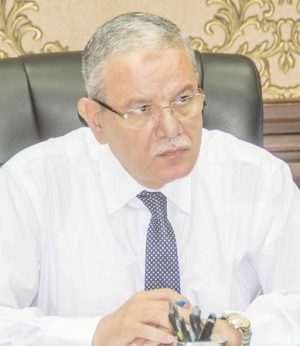By: Dr. Ashraf Ramelah | Voice of the Copts
General Essam Al-Badawi was installed as Al Minya’s governor (in Upper Egypt) in September 2016 when President Al-Sisi was replacing local officials. He graduated from the police academy in the mid-eighties last century after a long career with the National Security Service. Statements made recently by the governor in response to antagonism and threats towards Christians and the forced closing of Saint George Church (on Oct 27) have aroused widespread suspicion of him among Copts inside and outside Egypt.
His denial of “sectarian” strife as the cause of the recent closures of three churches and an assault on a fourth issued on the heels of Bishop Makarious’ pointed objections displays his interest in gaining control over this narrative with a pro-Islamic stance. Sectarianism is rife with Muslim civil servants and becomes an obstacle to any attempts at equality under the law.
How could Governor Al-Badawi not see that the mosque inflated its numbers with jihadists in order to pose a threat and strike the church across the road? And now, after the fact, what do Copts risk by speaking up? In an attempt to silence Copts, the governor schooled them: “It is not permissible to raise internal problems in international and local media.” But Copts need to be heard outside of Al Minya and seek only justice.
In countering a public statement made by the bishop, the governor patronized, flattered, and feigned ignorance regarding the detrimental “peace reconciliations” for Copts who are corralled into rigged tribal agreements and kept from the courts. In other words, it is evident to Copts directly involved or following it closely that the governor has no interest in truth or justice.
Governor Al-Badawi cautioned Bishop Makarious to regard his sources more carefully for the sake of accuracy as if the bishop had the basic facts wrong. “With great confidence in the wisdom and rationality of the bishop” the governor began and proceeded to say that “through sincere cooperation between the bishop and the organs of the province” there would be “agreed implementation of the solutions.” In other words, this Islamic bureaucrat instructs to toe the line and the solutions will come from ignoring the facts and excusing the culprits.
Exasperated by the governor’s request for cooperation with a system that’s well-known for incriminating Christian victims, Monsignor Athanasius George replied, “Where were you when the attacks, insults, vandalism and injuries took place? Where were you when barbarians and bandits became self-appointed rulers?” Sarcastically he added, “It is better that you remove the ISIS flag from your provincial building.”
Governor Al-Badawi warned Copts against pursuing justice, cautioning that irritating “religious citizens who love their religion,” i.e. jihadists, might incite them to strike again if Copts persist. Coptic MP, Marian Azer, seems to agree with the governor. With the expectations of her to represent her own people and at least take a role to insure that evidence is factual, she remains silent. Azer instead reassures the American delegation days after the incident of non-discriminatory treatment of Copts: “…all Muslims and Christians are living under the umbrella of the homeland as equal citizens in rights and freedoms without distinction in any field.” Sadly, misinformation is their take-away.
Muslim and Christian support for Al Minya Copts
The largely Muslim and Muslim-led political party, the Egyptian Secular Party, put MP Azer to shame. It issued a statement strongly condemning “the wave of church closures in Al Minya” stressing its absolute belief in the right of every citizen to practice the rites of religion and beliefs whatever they are without restrictions or conditions – further emphasizing the repeal of the unfair church construction law and proclaiming a unified law on places of worship, a meaningful reform for Copts.
Likeminded Kamal Suleiman Bishara, former MP and member of the Christian community, urged a fact-finding commission: “The president must immediately send a committee to Al Minya to investigate the truth about what is happening on the ground against Christians and their churches and not rely on misleading reports from the security and executive services.”
Coptic Bishop Agathon of Magagha and Al Adwa (Upper Egypt) issued a statement of support for Bishop Makarius and the Coptic community of Al Minya and Abukarqas in their legitimate demand for the right to pray and practice religious rites, pointing out the repeated attacks by outlaws against the Copts and stressing their rights as guaranteed under the law and current constitution.
Bishop Agathon’s signature was notably absent from an earlier dhimmi-style (appeasing and assuming inferiority) press release issued from the Coptic Orthodox Diocese of Mallawi Ashmonin gushing thanks to the governor of Al Minya, as well as President Al Sisi, the prime minister, the interior minister, the security director of Al Minya, the director of national security of Al Minya, officers and police staff for their hard work to resolve the variety of problems concerning Coptic issues as well as serving the Coptic Church.
So far, their hard work has led them to unsatisfactory and unacceptable solutions: The church closure issue is ignored and Saint George remains closed indefinitely, other churches have been shut down since the crisis, perpetrators are not arrested for their encroachments and threats which led to police closing the victimized church, and finally, a “conciliation” meeting has been thrust upon Copts for the purpose of submission and further threats.
Governor Al-Badawi is Al-Sisi’s man. He awaits direct orders from the top. If he does not receive a clear dictate to treat Copts equality and fairly he will adhere to Islamic doctrine and teachings. As it stands, the governor appears to take his lead from the Grand Imam who just a few weeks ago emphasized Islamic Sharia as Egypt’s rule of law.
















